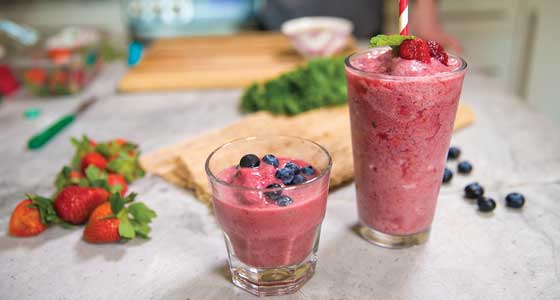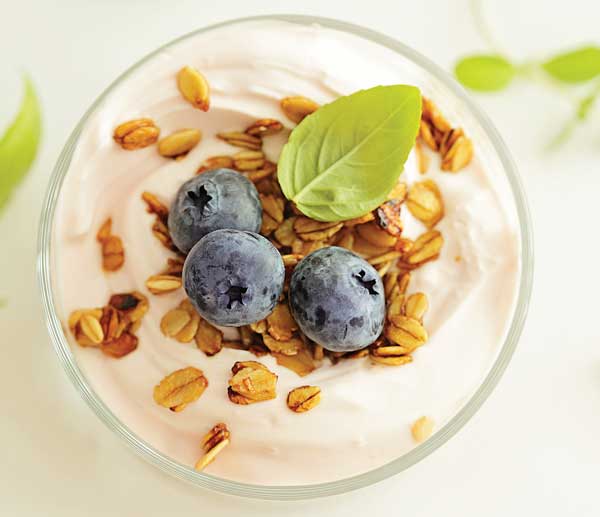Ingredients for a Healthier Gut
NUTRACEUTICALS

Interest in digestive health and the balance of good to bad bacteria in the gut continues to grow. “There is a lot of discussion these days about gut health and that it is the foundation of overall human health,” observes Samantha Ford, business development director at AIDP. “Many health conditions beyond just digestive issues—ranging from mood and cognition, skin conditions, allergies, and immune issues—have been linked to poor digestive health.”
According to the National Digestive Diseases Information Clearinghouse, some 60–70 million Americans have digestive (gut) health issues, says Doris Dougherty, Fibersol technical service representative at ADM. “The demand for digestive health assistance is further driven by lifestyle choices—including diminished physical activity, stress, alcohol consumption, and use of antibiotics/over-the-counter medications—making gut health a top-ranking trend in the health and nutrition segments,” she says.
More foods, beverages, and supplements that promote digestive health are hitting the shelves, and these products extend beyond yogurt and probiotics, which are now understood by consumers to be beneficial for the gut. For example, BiomeBliss is a blend of inulin, beta-glucan from oats, and polyphenols from blueberries that promotes a healthy microbiome in the gut. According to the company, the inulin from agave helps control hunger and regulate blood sugar; the beta-glucan helps protect the lining of the digestive tract; and the polyphenols help to shift the growth of bacteria to more healthy populations.
Another supplement, GastroAD from Lallemand Health Solutions, is produced by fermentation of soy by Lactobacillus delbrueckii (a strain also known as Rosell-187). It contains natural elements of soybeans, peptides resulting from fermentation, and components of Rosell-187. It brings quick relief to digestive discomfort, nausea, and gastric pain.
Regular Girl is a synbiotic blend of prebiotic fiber (Sunfiber from Taiyo) and probiotics (Bifidobacterium lactis) that helps maintain a healthy digestive balance.
Here is a look at some of the gut-healthy ingredients used in these products as well as others that research indicates may have digestive benefits.
Probiotics
Today’s consumers understand what probiotics are and that they help create and maintain a healthy balance of good to bad bacteria in the intestines. Not only do probiotics compete and interfere with the growth of pathogens, they also create a friendlier gut environment by producing short-chain fatty acids, correcting imbalances of intestinal microflora, and helping regulate intestinal transit time.
Probiotic manufacturers have been doing due diligence on research and clinical studies supporting individual probiotics. For example, GanedenBC30 (Bacillus coagulans GBI-30, 6086) from Kerry for Wellmune and GanedenBC30 is a spore-forming, patented probiotic ingredient that is backed by more than 25 published papers. Nyangale et al. (2015) showed that daily consumption of GanedenBC30 by adults aged 65–80 years can increase beneficial groups of bacteria in the human gut and potentially increase production of anti-inflammatory cytokines. GanedenBC30 is a stable probiotic due to the cell’s ability to form a protective spore, which allows it to survive harsh manufacturing processes, product shelf life, and travel through the digestive system.
Last year, Sabinsa was granted a U.S. patent for its shelf-stable probiotic, LactoSpore, in combination with cranberry seed fibers. The patent discloses a method of increasing the viable colony count of Bacillus coagulans MTCC 5856 in a synbiotic composition containing natural plant fibers from Vaccinium oxycoccos (cranberry). The combination product, which supports digestive health, is sold under the name LactoCran, with the cranberry seed fiber components supplied by Fruit d’Or Nutraceuticals.
DuPont Nutrition & Health offers HOWARU probiotics, a line of highly documented single strains and proprietary blends, all with proven health benefits backed by clinical research. HOWARU Dophilus is a Lactobacillus strain whose digestive health benefits have been studied since the early 1970s. HOWARU Bifido (Bifidobacterium lactis HN019) has been shown to modulate the intestinal microflora and improve transit time.
Prebiotics and Fiber
In the 1980s, yogurt (noted for its probiotic benefits) was the first entry into the market for digestive health products, observes Ford. “Now the discussion has turned to prebiotics as well, as they are a fertilizer, so to speak, that enable probiotics to grow and proliferate in the GI tract,” she says.
AIDP offers several prebiotic ingredients that are scientifically proven through human clinical studies and consumer feedback to support digestive health. The company’s newest offering is NeoGOS, a clinically proven, next-generation, patented form of galactooligo-saccharide (GOS) prebiotic that promotes healthy bacterial growth. “NeoGOS is similar to what is found naturally occurring in human milk,” says Ford. “It is safe, effective, and is highly tolerable. A unique attribute is [that] its processing greatly lowers the monosaccharide fraction of the GOS, making it low glycemic.”
PreticX XOS (xylooligosaccharide), another AIDP prebiotic ingredient, has been shown in human clinical studies to selectively boost healthy Bifidobacteria while reducing unhealthy bacteria in the gut, promoting metabolic reconditioning. “A major advantage of PreticX is its clinical effectiveness at low dosages, compared to other ingredients in this space, thereby greatly reducing undesirable side effects,” adds Ford. AIDP launched a 100% certified organic version of PreticX earlier this year.
 “Dietary fiber that meets the definition of a prebiotic answers consumers’ desires for a holistic approach to digestive health,” says Dougherty at ADM/Matsutani. ADM/Matsutani offers the Fibersol line of low-viscosity soluble prebiotic dietary fiber ingredients. “Over 30 years of clinical research and almost 100 published studies contributed to demonstrating Fibersol’s physiological benefits. These studies outline how Fibersol helps maintain intestinal regularity, attenuate post-meal blood glucose levels, and retain healthy post-meal serum triglycerides,” says Dougherty.
“Dietary fiber that meets the definition of a prebiotic answers consumers’ desires for a holistic approach to digestive health,” says Dougherty at ADM/Matsutani. ADM/Matsutani offers the Fibersol line of low-viscosity soluble prebiotic dietary fiber ingredients. “Over 30 years of clinical research and almost 100 published studies contributed to demonstrating Fibersol’s physiological benefits. These studies outline how Fibersol helps maintain intestinal regularity, attenuate post-meal blood glucose levels, and retain healthy post-meal serum triglycerides,” says Dougherty.
ADM/Matsutani’s most recent clinical study confirmed that Fibersol is a prebiotic fiber and that it promotes the growth of certain beneficial bacterial strains. “Soluble dietary fibers may provide less overall (but still significant) bulk, regardless of whether low or high in viscosity, compared to insoluble fibers. However, they can also affect intestinal health positively by fostering the growth of beneficial bacteria and/or promoting laxation,” explains Dougherty. In addition, Fibersol has been shown to help maintain intestinal regularity while being gentler in producing fermentation off-gas and GI discomfort compared to other added fibers.
A unique formula, SunCran Naturelle, from Taiyo, supports both gut and urinary tract health. It combines Taiyo’s Sunfiber soluble guar fiber with Fruit d’Or’s cranberry juice powder, offering prebiotic fiber and cranberry juice benefits. Sourced from the guar bean, Sunfiber has strong prebiotic characteristics that stimulate health-promoting indigenous gut bacteria such as Lactobacilli and Bifidobacteria and minimize harmful bacteria. It has been shown in more than 120 clinical studies to support digestive health without uncomfortable side effects. Kapoor et al. (2017), for example, suggested that its consumption led to an impact on constipation prevention similar to that achieved with laxatives.
BENEO offers Orafti Inulin and Orafti Oligofructose, naturally extracted from chicory root. Not only do these fiber ingredients have a positive influence on gut microflora by supporting good bacteria, they also contribute to a better regulated transit and a higher stool frequency. In January 2015, EFSA published a positive evaluation on Orafti Inulin’s improving effect on bowel function by increasing stool frequency.
Buddington et al. (2017) showed that a daily supplement with Orafti P95 (short-chain inulin-type fructan derived from chicory roots) provided a laxation effect without causing gastrointestinal distress for healthy participants with irregularity associated with low dietary fiber intake. In a more recent study, Lohner et al. (2018) showed that chicory root fiber (a variant of Orafti inulin) improved digestive health and strengthened defenses in children aged 3–6 years. Improved gut microbiota composition, softer stools in a normal range, and fewer incidents of infections were observed in those receiving a daily dosage of 6 g of chicory root fiber.
Other companies offer fiber and prebiotic ingredients that have digestive health benefits. Cargill’s Oliggo-Fiber chicory root fiber has been shown to be an effective prebiotic, stimulating Bifidobacteria at a dosage of just 5 g/day. DuPont Nutrition & Health’s Litesse polydextrose is a highly branched polymer of glucose whose unique arrangement of glycosidic linkages makes it resistant to hydrolysis by human digestive enzymes. Research has indicated that Litesse promotes the generation of short-chain fatty acids and enhances saccharolytic fermentation, thus reducing colonic pH. Finally, Ingredion’s NUTRAFLORA prebiotic fiber helps increase the level of good bacteria in the gut, while its NUTRIOSE soluble fiber has been shown to have a positive effect on digestive health while providing satiety and weight management benefits, all with no digestive tolerance issues.
 Beyond Probiotics and Prebiotics
Beyond Probiotics and Prebiotics
Many other ingredients and whole foods such as mangoes, kiwi, walnuts, and yeast fermentate show promise for digestive health.
Venancio et al. (2018) showed that the consumption of mangoes improved symptoms and associated biomarkers of constipation beyond an equivalent amount of fiber. The results found that mangoes, which contain a combination of polyphenols and fiber, significantly improved constipation status (stool frequency, consistency, and shape) and increased gastrin levels and fecal concentrations of short-chain fatty acid (valeric acid) while lowering endotoxin and interleukin 6 concentrations in plasma.
Holscher et al. (2018) demonstrated that walnut consumption affected the composition and function of the human gastrointestinal microbiota, increasing the relative abundance of microbes that produce butyrate, a beneficial metabolite for colonic health. For the study, 18 healthy male and female adults consumed diets that either included no walnuts or 42 g of walnuts for two 3-week periods. Consuming walnuts resulted in higher relative abundance of three bacteria of interest: Faecalibacterium, Roseburia, and Clostridium.
AIDP’s Livaux prebiotic is a whole kiwi fruit ingredient shown to increase healthy Faecalibacterium prausnitzii. F. prau is the most abundant bacteria species in the gut, accounting for more than 8% of the total colonic microbiota. It is extremely important for the production of short-chain fatty acids in the gut, maintaining gut barrier function, and reducing oxidative stress, explains Ford. “Despite its importance, F. prauis sensitive to oxygen and cannot be obtained through supplemented probiotics, lending to the uniqueness of Livaux and its ability to naturally support healthy F. prau levels.”
AIDP offers Actazin, another kiwi-based ingredient that is ideal for promoting bowel regularity. It is a cold-pressed kiwi fruit concentrate that supports regular bowel movements through its natural abundance of soluble and insoluble fibers, polyphenols, and the enzyme actinidin.
EpiCor from Embria is a dried fermentate made using Saccharomyces cerevisiae. The ingredient contains a unique complex of beneficial metabolite bioactives and a number of useful compounds such as proteins, peptides, antioxidants, polyphenols, organic acids, and nucleotides. Clinical studies support the ingredient’s immune health benefits. Pinheiro et al. (2017) showed that EpiCor fermentate can modulate the composition of the gut microbiome, resulting in improvement of constipation-associated symptoms.
Next month’s Nutraceuticals section will showcase ingredients used to formulate better-for-you beverages.
 Linda Milo Ohr,
Linda Milo Ohr,Contributing Editor
Denver, Colo.
[email protected]
References
Buddington, R. K., C. Capadia, F. Neumer, and S. Theis. 2017. “Oligofructose Provides Laxation for Irregularity Associated with Low Fiber Intake.” Nutrients 9(12): 1372.
Holscher, H. D., H. M. Guetterman, K. S. Swanson, et al. 2018. “Walnut Consumption Alters the Gastrointestinal Microbiota, Microbially Derived Secondary Bile Acids, and Health Markers in Healthy Adults: A Randomized Controlled Trial.” J. Nutr. 148(6): 861–867.
Kapoor, M. P., M. Sugita, Y. Fukuzawa, and T. Okubo. 2017. “Impact of Partially Hydrolyzed Guar Gum (PHGG) on Constipation Prevention: A Systematic Review and Meta-analysis.” J. Func. Foods. 33: 52–66.
Lohner, S., V. Jakobik, K. Mihályi, et al. 2018. “Inulin-Type Fructan Supplementation of 3- to 6-Year-Old Children Is Associated with Higher Fecal Bifidobacterium Concentrations and Fewer Febrile Episodes Requiring Medical Attention.” J. Nutr. 148(8): 1300–1308.
Nyangale, E., S. Farmer, H. A. Cash, D. Keller, D. Chernoff, and G. R. Gibson. 2015. “Bacillus coagulans GBI-30, 6086 Modulates Faecalibacterium prausnitzii in Older Men and Women.” J. Nutr. 145(7): 1446–1452.
Pinheiro, I., L. Robinson, A. Verhelst, et al. 2017. “A Yeast Fermentate Improves Gastrointestinal Discomfort and Constipation by Modulation of the Gut Microbiome: Results from a Randomized Double-blind Placebo-controlled Pilot Trial.” BMC Complementary and Alternative Medicine. 17: 441.
Venancio, V. P., H. Kim, M. A. Sirven, et al. 2018. “Polyphenol-rich Mango (Mangifera indica L.) Ameliorate Functional Constipation Symptoms in Humans beyond Equivalent Amount of Fiber.” Mol. Nutr. Food Res. 62(12).


